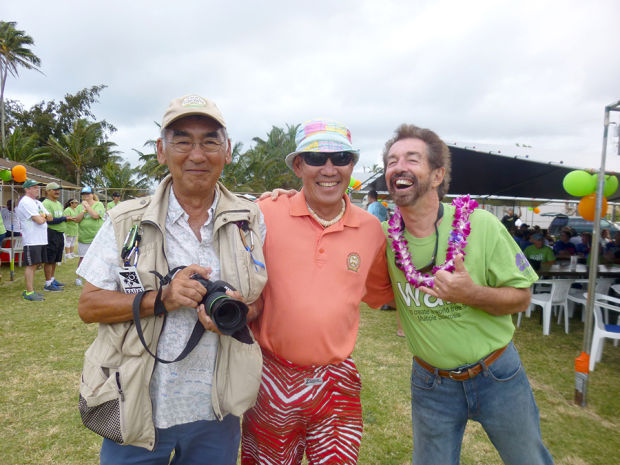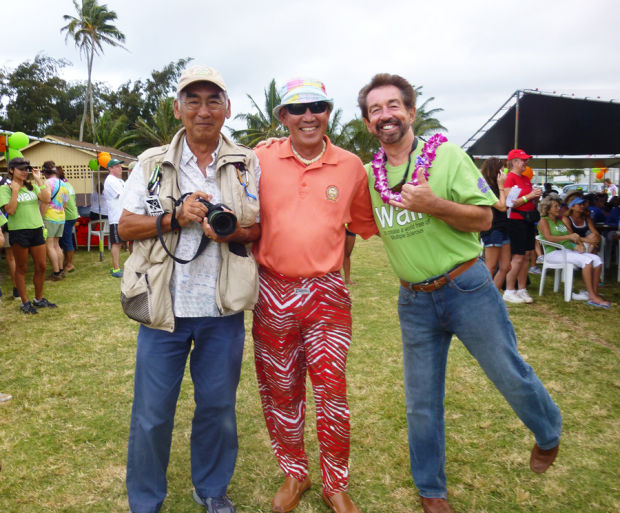Telling our stories
Ron Wiley. Dickie Chang. Dennis Fujimoto.
Editor’s note: This is the first of two parts. The second will be published in TGI on Friday.
Ron Wiley. Dickie Chang. Dennis Fujimoto.
For decades, those men have been covering Kauai with unparalleled dedication.
Wiley recently celebrated his 25th year at KQNG Radio. Chang marked 20 years with his cable show Wala’au, a feat bolstered by 30 years in the tourism industry. And Fujimoto has been brightening the pages of The Garden Island newspaper since the 1950s — he covered Pop Warner Football as a fifth grader, and snapped his first front-page photo, of a fire in Niumalu, while driving to high school.
The three men are very different, but they share some striking similarities in addition to career longevity. Most notably, they share a deep love for the community and an apparently 24/7 commitment to their job. In fact, that diligence is so absolute, “job” isn’t really the right word.
“The thing that we have that’s pretty close in common is that what we do is our life,” Wiley said, gesturing to the other two at a recent talk story session with all three icons.
“That’s right!” Fujimoto chimed in. “That’s why there’s no day off, and there’s no holiday.”
So the answer to the oft-asked question, “Are you ever not working?” is easy: “Not really, no,” Wiley said with a laugh. “People habitually ask me, ‘Gee, don’t you have a life?’’ But this is it. This is it.”
“I think Ron summed it up the best: What we do is our lives,” Chang said. “You wake up, and it’s like what can I do to be a part of, not apart from, the community? What do we need to do to make this thing positive, you know, make it happening?
“I think we all try to be where we need to be in the community,” he explained. “And the thing that impresses me most, is these guys are always there. If I wasn’t there, these guys are there. They are way more visible than I am, and I try to be visible. But when I go somewhere and I see these guys, I say, ‘Man, you got nowhere else to be?’”
Dedicated, but different
Chang summed up his fellow media icons like this: “Ron is Ron. He’s humble, he’s genuine, he’s honest, he’s smarter than the average bear. Dennis is Dennis. He don’t sleep, he don’t eat. he doesn’t sit. And he’s like a clone: there’s like three of him. There are at least three.”
Wiley agreed, laughing: “He’s one of triplets! It’s a big facade!”
“It’s Moe, Larry and Curly, but the name is Dennis,” Chang quipped.
“And he smokes us, as far as getting to events,” Wiley said. “He goes to way more events than the two of us!”
“Well, he’s got the connections, as far as getting through the police lines,” Chang said. “When the ambulance goes by and the fire truck goes by, Dennis is the guy driving ahead of them, through the road blocks. That’s true story.”
After all, the trio are storytellers. They uncover and share the island’s stories with an audience who can’t experience them firsthand.
“We’re there for the betterment (of Kauai), to reach out and to tell people what’s going on,” Chang said. “To me, it’s the weirdest thing: think about how many guys from Hanalei never go to Kapaa, and how many guys from Lihue never been to the canyon. They got three jobs and they can’t be where we are, but they can see our stuff and they can relate.”
In fact, even people who attend community events like to see them covered, so they can see the parts they missed, Chang said. Plus, fundraising often continues after the signature event, when someone who couldn’t attend watches Chang’s show or reads Fujimoto’s story, then decides to contribute to the cause. That’s an important role to these three, and one that takes a concentrated effort to achieve.
Chang tried to downplay his role, explaining that unlike the other two, “I’m not working eight days a week,” or at least not on his weekly show on Oceanic Time Warner. He is, however, hard at work in his other full-time role as director of sales and marketing for Kilohana Plantation.
“Wala‘au is the easy part,” he joked. “And I do need to credit Bruce Smalling a lot, too, because I’m the front guy but someone’s got to shoot the film and someone’s got to edit,” he said.
Wiley corrected him, “But the common thing is that ‘work’ isn’t really the right word. No. No.”
“It’s life,” Chang said, finishing the thought, as Fujimoto nodded in agreement.
“We are expressing ourselves in an artistic manner, inside a business, and that business sometimes raises its head, whether it’s ugly or not,” Wiley explained.
The celebrity factor
Something happens when you’re as visible as these guys are for so many years. When you’re such a familiar presence, in good times and in bad, people begin to think they know you.
“Good feeling,” Wiley said emphatically. “I like it.”
When people hear his voice in real life, they greet him like an old friend. Even the homeless hail Wiley with his well-known line, “I love you, Laura!” when he drives past. He’s a public figure and appears to enjoy it thoroughly.
Chang agreed — to a point.
“It is a good feeling, but sometimes I feel bad, because somebody knows you so intimately and so well, because they (watch) you, and I’m like ‘Who …?’ Because these guys, they know you, and they think you know them, and I feel bad, because I don’t know their names.
“There are a couple who just listen, or look or watch, and they think, ‘Oh, I know this guy,” and they think, ‘This guy knows me,’ but I never met ‘em in my life. It’s a trip, because you want to be nice, but I always want to address people by names. It’s prideful.”
Fujimoto waves off notions of being a celebrity. He shrugs off accolades and is notorious for being unable to attend ceremonies to accept awards, because he’s “too busy working! Got stuff to do!”
That humility has not gone unnoticed by his media brethren.
“I would say that Dickie and I do share the ability to accept our ‘center of attention’ status,” Wiley said. “And Dennis doesn’t consider himself a celebrity, doesn’t act like a celebrity, even though he is.”
“I agree,” Chang said.
There was another point Wiley wanted made.
“I think it should be said that Dennis Fujimoto does not like having his picture taken,” Wiley declared. “I think somebody should write that down, and it’s so funny because he’s the guy who photographs everybody else!”
In fact, Wiley makes a practice of snapping photos of the camera-shy Fujimoto at public events; he has an entire collection of shots of the Happy Camper behind the lens.
Fujimoto politely but emphatically waved off repeated requests for a photo, any photo, from his early days to illustrate this article.
“Not of me. I don’t do the selfies,” he chuckled.
While he is a treasure trove of island names and history, with deep family roots and an even longer memory, he’s not one to talk about himself easily. Even direct questions tend to lead to stories about other people, other times.
“I just keep on going. That’s all there is to it,” he said simply. “This is a great place to be. For me, I’m not the variable. I don’t move. I stay here, and I get to meet some of the greatest people in the world. Some of them stay here, and some of them go off, but you know, I’ve worked with a lot of good people.”
Mutual admiration
The three were full of praise for each other’s work.
Chang and Fujimoto agreed that Wiley is who they — like the rest of Kauai — tune in to during times of crisis for on-the-spot news updates.
“It’s like, whenever I gotta respond, if I got a traffic accident or a fire, it’s like, 93.5, and Ron’s there,” Fujimoto said. “Whether we’re talking about Ka Loko, whether we’re talking about Iniki, or just something down the street, he’s there. He’s every day. And I think it’s just the way it is. It’s just like when they open the paper and there I am, every day.”
That he is. Fujimoto has immortalized key moments of island life for multiple generations with his gift of capturing the sheer beauty of the island — and its people. At pretty much any gathering of any size, he can be spotted, working the edges of the crowd with his trusty camera, or zeroing in on the action at sporting events large and small.
As Chang tells people, “You know your event is an event if the Happy Camper is here.”
Both are outspoken fans of Fujimoto’s work.
“The thing about the newspaper, to me, is that there’s a bit of immortality,” Wiley said. “I have Dennis Fujimoto pictures on my refrigerator with magnets on them that he’s done, they’re so good. And they’ll stay there until the newspaper deteriorates.”
The men have impacted the fabric of island life in myriad other ways.
“People see us doing our thing, but that’s just scratching the surface of what we do in public and private life,” Chang said.
Wiley tirelessly lends his voice and talents to assisting the island’s most vulnerable populations, raising awareness and funds. His efforts with Kauai United Way are legendary, working for “20-some years” to help those in need.
Chang, who also has toiled for United Way and various nonprofits, even parlayed his concern for the community into political service. He served as a county councilman, after being inspired by the late Mayor Bryan Baptiste’s example to “be there and try to help people.”
Wala‘au’s 20th birthday was used to help others. The celebration raised awareness — and funds — for suicide prevention, with 100 percent of the profits from the party going to support Life’s Bridges Hawaii.
Fujimoto is too busy drawing attention to stories we might not otherwise see to serve on many boards. But one of his creative contributions literally lights up the island every year — he is the mastermind behind the annual Lights on Rice parade. While many might not know it, because of that previously mentioned humility, Fujimoto came up with the idea almost 20 years ago and worked hard to make it become a reality, for all the kids who might never get to travel to Disneyland and see that famous lighted parade.
“When we started the parade, we used all those old-style values, and we were able to honor almost all of the old-timers who had an influence in how we got that parade started,” Fujimoto said. “We got to hear them say, ‘Wow, that’s how it supposed to be.’ It’s like the MasterCard (ad): priceless.”
Support. Service. Giving back to the community. Plus doing their job of telling us our stories, day in and day out, decade after decade.
That’s what these three do.



